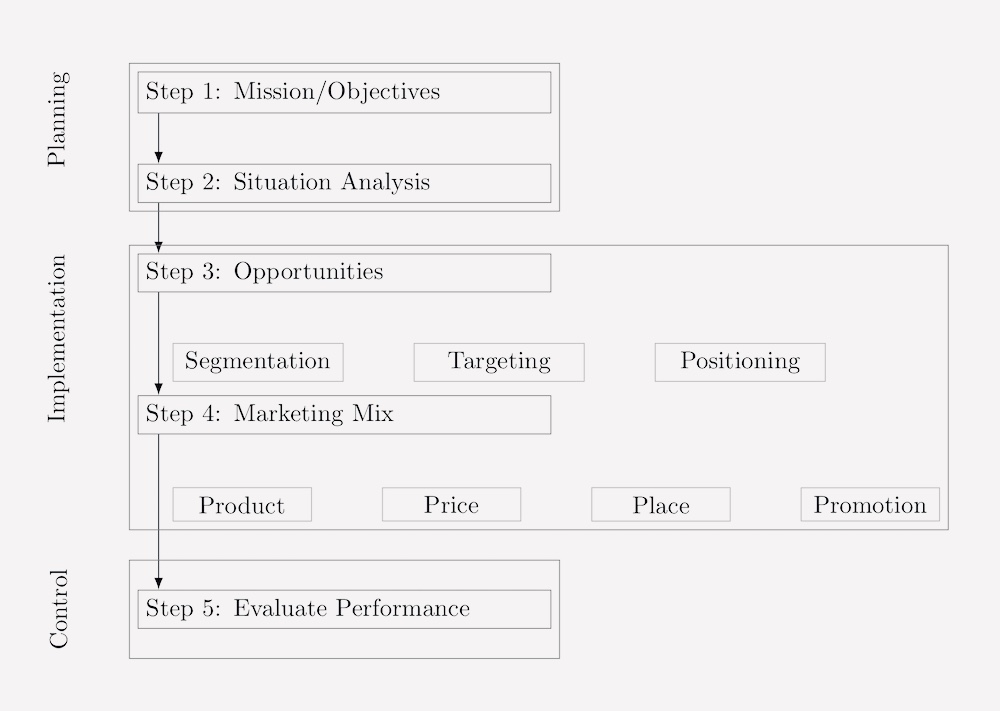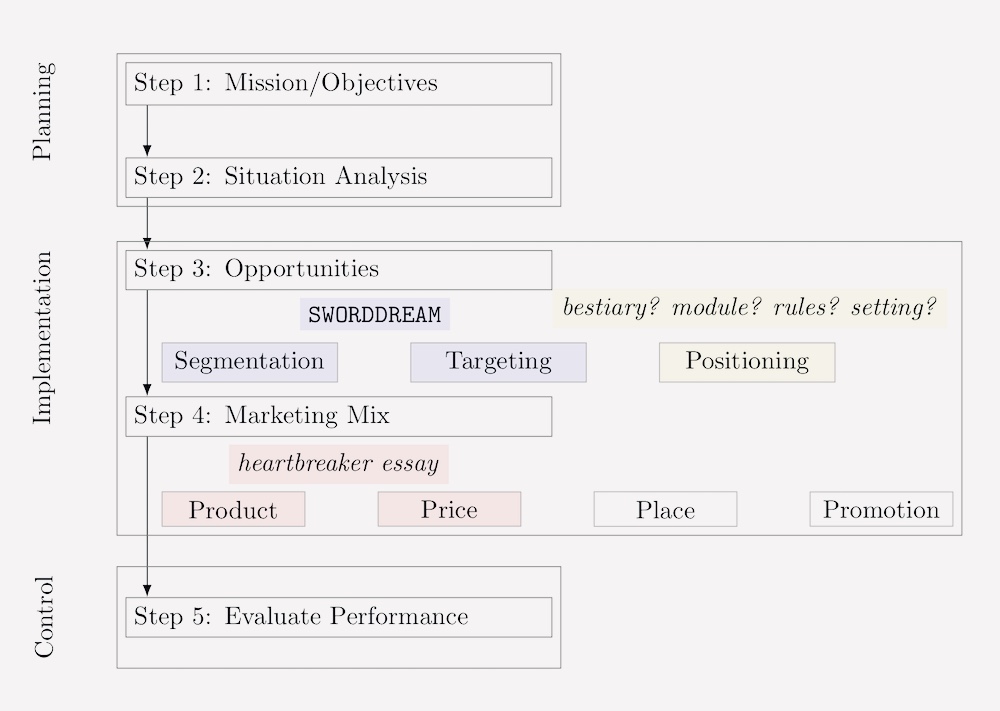Many of us, where by “us” I mean people who discuss tabletop roleplaying games online, have decided to market aspects of our shared hobby. Whatever your attitude toward this development, I think few people would argue against the reality of this basic claim. If you are selling something on drivethrurpg, or a similar platform, you are marketing your work. Considering various hobby developments in terms of how they fit into the process of marketing, then, would, at the very least, probably help explain hobby dynamics.
Colloquially, people often use “marketing” as shorthand for either advertising or persuasion techniques. While advertising is part of marketing, it is a rather small part, on balance. A broader perspective will be more useful. (There is some business speak incoming, but stay with me.)
One framework for developing a marketing plan is the following:

Here are a few, far from comprehensive, examples of how this applies to tabletop roleplaying games, particularly the online part of the hobby.
Positioning is the conceptual space your creation occupies in the minds of the audience. Is it medicine—the way cocktail bitters were originally sold, for example—or narcotic enhancement? Is Silent Titans a campaign setting, an adventure module, or an art book? Consider whether you would be more likely to check out Anomalous Subsurface Environment if it were presented as yet another B/X-inspired retro-clone or as a dungeon module or as a campaign setting. If you start in your own head, looking at the product you have created, it might be obvious that Silent Titans is both art book and adventure module—at least. However, your audience—the people you would like to derive value from your creation—starts with their own concerns; you want them to end up at your product. If your audience would be happy with, or is seeking out, an art book, but you position your creation as an old school adventure module, there is less, maybe no, conceptual intersection.
The marketing mix is a classification for strategies used to get your creation into the hands of your audience—your choice of what to create (product), vector of exchange (place), and so forth. Ron Edwards’ heartbreaker essay can almost entirely be summarized as a critique of the mismatch between hobbyist writer hopes or expectations and some elements of the marketing mix—mostly product and price. He wrote that the market context at the time—which has changed substantially—would generally lead to failure for hobbyists publishing a certain kind of game in a certain way. He then used this claim to argue that designers, or at least designers in the orbit of the Forge at the time, would do better for themselves if they focused on the kind of games Edwards liked, which prioritized originality of concepts in mechanics and trope landmarks detached from mainstream Dungeons & Dragons. So, the heartbreaker essay speaks to concerns about the marketing mix.
How about a more recent example? Take SWORDDREAM. Superficially, SWORDDREAM bills itself as a social manifesto of sorts: be inclusive, facilitate consent, pay fairly, and so forth. A big part of what the principles do, taken together, is define a group of people based on shared values and, perhaps, by generational cohort. This is a form of segmentation and targeting, making SWORDDREAM a guerrilla—or collaborative—marketing strategy. Consistent with this understanding, one of the major venues of SWORDDREAM activity has been on a marketing platform—itch.io dreamjam—the page for which is currently the highest ranked Google search result that leads to a page explaining the SWORDDREAM principles. (Please avoid misunderstanding this point as some sort of veiled dunk on the content of any specific SWORDDREAM principle. I am analyzing SWORDDREAM functionally, looking at how it seems to be operating, rather than implying some ulterior or hypocritical motive.)

One final example. On Twitter, I have seen several iterations of negative feedback regarding an upcoming official D&D Eberron sourcebook, culminating in the question: why are books like this successful?
The framework above suggests some reasons, even being agnostic about the aesthetic quality of the cover. First, place: Hasbro has these in distribution, and the retail channel both increases the likelihood that “new Eberron book” will enter the audience’s consideration set for entertainment expenditure and provides an avenue for purchase. Second, segmentation: based on past products, Wizards of the Coast has a group of loyal customers that will of their own accord seek out official D&D settings or new Eberron products. Third, positioning: D&D has a recognizable brand that immediately places the product in a conceptual space that already exists in the minds of a relatively broad audience. You might respond: of what relevance is D&D brand equity to me, a lowly hobby producer lacking the resources of Hasbro to buy a portion of the collective meaning space that already exists in the minds of potential audience? (That is what the D&D brand is, after all.) The lesson is, again, to get out of your own head and think from the perspective of the people you want to derive value from your creation. Have you created some, however limited, fragment of shared meaning that people other than you will understand? Actual successful communication between people is far less common than most people imagine. Reuse this established conceptual landmarks if possible because otherwise you will have to do that work again.

This is super interesting and I understand almost everything because I work in a digital marketing agency (as a copy editor). And I’ve been thinking about this for days concerning the failure of Patrick Stuart’s last fundrasining campaign for his poetry book; Patrick wanted his book to be acquired by OSR people, especially those who own Silent Titans, but I guess only a very small fraction of the hobby is actually interested on poetry. But if it was targeted to poetry people, there would be the risk that they wouldn’t care about another edition of Gawain, since there are many, but probably enough to fund the project.
I feel this is a major limitation of the critique of “railroaded” Wizards D&D adventures — if they were so inherently repugnant there wouldn’t be a market for them. Most online commentary valorizes the kind of content and process that sells to a mature, agile, creative DM *who has also absorbed a certain ideology of play*.
You mean that a lot of the commentary is too focused on GMs who’ve adopted the OSR mindset?
There’s definitely a science to it. Some of the things I’ve tried worked, but not everything.
So, in general, I agree with your analysis of SWORD DREAM as a kind of marketing strategy to identify and group people by shared values.
I would argue that, while I think that’s true, SWORD DREAM also strikes me as a response to a strong push to rebrand the OSR as an identity and grouping of people with shared values. Specifically, SWORD DREAM doesn’t emerge until after Stuart Robinson attempted to declare the “OSR” logo off-limits for hatespeech, and was harassed relentlessly by self-declared advocates of the OSR until he dropped out of the scene entirely.
The move to rebrand the OSR as a place where “free speech” is prioritized above all possible concerns about the content of that speech and mass-harassment tactics are justified against perceived opponents, I believe, is what gives rise to the SWORD DREAM as an alternative “brand” for retro-roleplaying, organized around values diametrically opposed to the ones that espoused by the recently rebranded OSR. (The recent decisions by Hobbs & Friends to republish their interview with a prominent fascist, and Raven Crowking’s decision to conduct a non-DCC interview as a public demonstration of “reaching across the aisle” are likely also manifestations of this new OSR ethos.)
I recognize that “the OSR isn’t dead”, not is it a monolith, but I think the SWORD DREAM cohort represents a group of people who would previously have probably used the “OSR” label for themselves, who are reacting against one very vocal strand of OSR membership by leaving to form a counter-scene.
Ah yes, the gaming interview about the superiority of Canadian healthcare. Good times!
Amen on the OSR there. People I like a lot want to save it from itself, but they’re just giving their good will to a bad scene. SWORDDREAM – Ummm. Well. the hearts in the right place…
Um…
Hey, I just want to say that this is an excellent post. For me, as a dude with near-zero background in business/marketing/etc. it not only makes a lot of sense (i.e. it’s easy for me to grasp these concepts) it also explains a lot (i.e. it’s fairly enlightening). Looking through the paradigm presented here, I can see how my past successes (and not-quite-successes) in the self-publishing industry may have been predicated on more than just my own skill/effort or the whims of fortune. That’s very helpful as I go forward. Thanks!
Re: the OSR and all that jazz…um…jeez.
Thanks JB.
I will likely write more about how marketing concepts apply to online game communities in the future at some point.